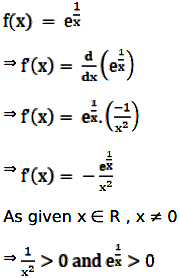Given:- Function f(x) = e\(\frac{1}{\text{x}}\)
Theorem:- Let f be a differentiable real function defined on an open interval (a, b).
(i) If f’(x) > 0 for all x ∈ (a, b), then f(x) is increasing on (a, b)
(ii) If f’(x) < 0 for all x ∈ (a, b), then f(x) is decreasing on (a, b)
Algorithm:-
(i) Obtain the function and put it equal to f(x)
(ii) Find f’(x)
(iii) Put f’(x) > 0 and solve this inequation.
For the value of x obtained in (ii) f(x) is increasing and for remaining points in its domain it is decreasing.
Here we have,

Their ratio is also greater than 0

as by applying –ve sign change in comparision sign
⇒ f’(x) < 0
Hence, condition for f(x) to be decreasing
Thus f(x) is decreasing for all x ≠ 0